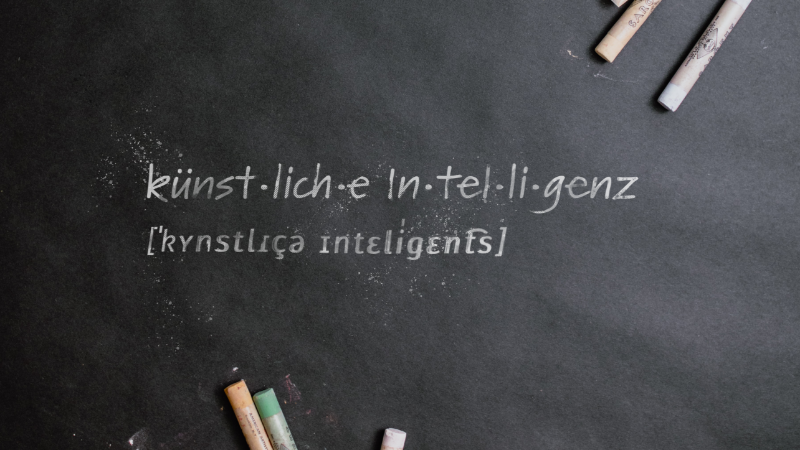
Research in Focus
Artificial intelligence and society
Artificial intelligence (AI) unveils a world where the capabilities of technical systems are similar to those of human intelligence. But, AI isn't just about algorithms; it's deeply interwoven with our society. The future of AI technologies is strongly interlinked with the automation of social processes and will touch every facet of our lives: From tailoring your social media feeds to driving innovations in healthcare and even climate research. It's beyond just the screens we scroll; it’s in our offices, our hospitals, our roads, and even in the cutting-edge robotic systems we design. Our research investigates the interplay of AI within the political, social, and cultural landscapes, and explores the impact of AI discourses on society.
The manifold benefits AI-systems are evident as we witness its pervasive impact on various domains. For example, technological automation is helping to evaluate large amounts of data and thus to generate new knowledge. Further examples include the analysis of diagnostic images in medicine, and the pattern recognition or analysis of voice, visual, or text data.
AI within our Society
AI systems are poised to undertake tasks that were once the exclusive domain of human capability. This intent to create proximity of AI technologies to the nature of human beings is illustrated through the widespread use of technical terms like "machine learning" or "neural networks", where the capabilities of technical systems are linked to rational intelligence similar to that found in humans.
Today, AI systems are used to support or replace humans in everyday life, and are associated with an increasing automation of social processes. This shift prompts critical reflections on many levels about AI in society, encompassing questions about accountability, autonomy, and trust.
As we contemplate the dynamic between AI and society, it's clear that the impact of artificial intelligence extends far beyond technology.
AI Systems for Public Good
At HIIG we are particularly interested in systems serving the public interest. In our research, we explore what public interest AI means in political theory, what challenges these projects face globally, and how AI systems with this purpose should be built and governed. The question of how AI affects society resonates deeply, urging us to explore the multidimensional impact of public interest AI on society. With the publicinterest.ai interface, our aim is to increase the data and discourse on public interest AI systems worldwide to increase exchange and share standards and learnings on how they are shaping our society.
Different traditions of thinking about AI
The imaginaries associated with AI also play a major role in shaping the societal implications of these technologies. What is associated with the term AI varies considerably from culture to culture, which is why in one of our projects we compare AI-related controversies in different countries, their media and policy-making. In more theoretical work, we investigate how different traditions of thought in European and Asian countries shape the ways AI is interpreted as both a risk or a solution.
Relatedly, it is impossible to think about artificial intelligence or artificial humans without creating particular ideas about what is human in the first place. In our research we pay particular attention to the relationship between humans and machines, which is strongly related to questions on machine autonomy.
In summary, it is crucial for us to further deepen our understanding of the complex relationship between AI. Our research emphasises the need for an informed dialogue to collaboratively shape the role that AI will play in our future.
MAKING SENSE OF THE DIGITAL SOCIETY
Louise Amoore: Our lives with algorithms
Explore how machine learning algorithms are radically changing the way we find meaning in society.
MAKING SENSE OF THE DIGITAL SOCIETY
Judith Simon: The ethics of AI and big data
How exactly can fundamental rights and moral values be taken into account when developing various AI systems?
Digitaler Salon
AI – The last one is cleaning up the internet
How is AI actually negotiated in our society, and do we need more information about the use and handling of AI?
Feature with Theresa Züger about the use of artificial intelligence for the common good
Unwillingly naked: How deepfake pornography intensifies sexualised violence against women
Deepfake pornography uses AI to create fake nude images without consent, primarily targeting women. Learn how it amplifies inequality and what must change.
Artificial intelligence with purpose: Mapping the landscape of public interest AI
How is AI being used for the common good? A new dataset is mapping the landscape of public interest AI by cataloguing impactful projects worldwide.
AI at the microphone: The voice of the future?
From synthesising voices and generating entire episodes, AI is transforming digital audio. Explore the opportunities and challenges of AI at the microphone.
Between vision and reality: Discourses about Sustainable AI in Germany
This article explores Sustainable AI and Germany's shift from optimism to concern about its environmental impact. Can AI really combat climate change?
One step forward, two steps back: Why artificial intelligence is currently mainly predicting the past
While AI is seen as technology of the future, it often relies on historical data. This blog post examines how AI can reproduce social inequalities and bias.
From theory to practice and back again: A journey in public interest AI
This blog post reflects on our initial Public Interest AI principles, using our experiences from developing Simba, an open-source German text simplifier.











